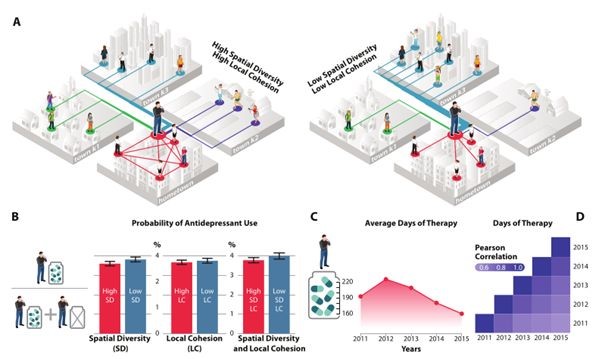Diverse Social Connections Can Reduce Antidepressant Use

Psychologists and social scientists have long known that close relationships help preserve mental well-being, offering crucial support during challenging times. However, the role of broader social networks in mental health has remained unexplored—until now.
Using data from the social media networks and antidepressant consumption of more than 270,000 individuals, the study demonstrates that patients with diverse social ties use fewer medications. These groundbreaking findings, published last December in the esteemed journal Science Advances, could pave the way for novel therapeutic approaches.
The research, a collaboration between HUN-REN KRTK, Corvinus University of Budapest, Umeå University, and Yale University, is the first globally to investigate links between complex social networks and mental health. The researchers anonymized data from Hungary’s iWiW social platform and paired it with antidepressant consumption statistics for 277,344 individuals from small towns between 2011 and 2015.
We were surprised by the initial results. Individuals with cohesive networks—many strong ties but few weak ones—were more likely to take antidepressants, which contradicted previous findings,
explained Balázs Lengyel, corresponding author of the study, group leader at HUN-KRTK, and research professor at Corvinus University.
It then became clear that examining the geographic aspects of networks is essential to differentiate between strong and weak ties effectively.
The study found that individuals with either cohesive local networks or connections to diverse remote communities were less likely to use antidepressants. Over time, patients with diverse community connections showed a sharper decline in antidepressant dose consumptions, even after accounting for local availability of the medication. This pattern was particularly pronounced among younger individuals compared to older ones.
While the data does not confirm causation, the researchers suggest that the extensive dataset reveals an overlooked link between the spatial diversity of social relationships and mental health. Both close and distant connections appear to play vital roles in maintaining psychological resilience and combating mental health disorders.

Spatial Structure of Social Networks Correlates with Antidepressant Use Probability